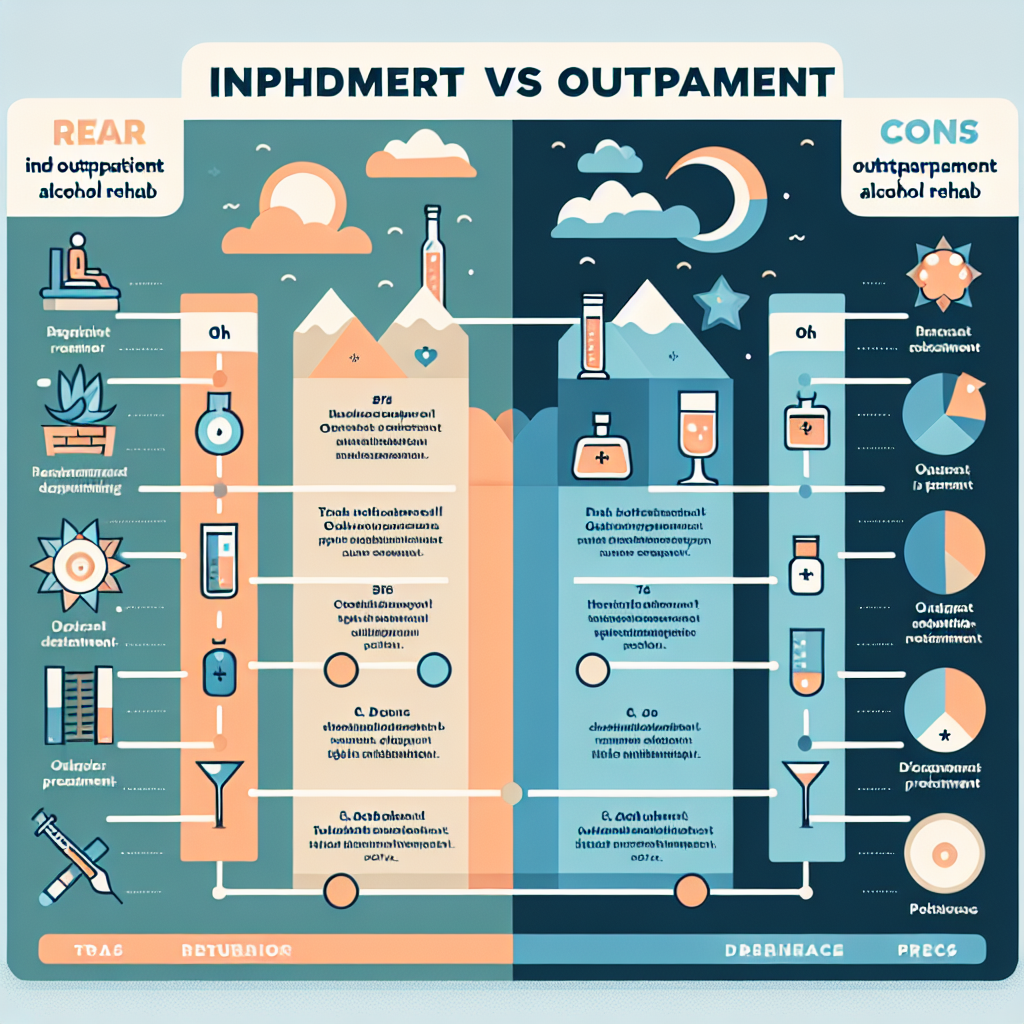-
Table of Contents

“Choosing the Right Path: Inpatient vs. Outpatient Rehab for Alcohol Recovery”
Introduction
When considering the best approach for alcohol recovery, individuals often face the choice between inpatient and outpatient rehab programs. Inpatient rehab, also known as residential treatment, involves staying at a facility for a designated period, providing a structured environment with 24/7 medical and emotional support. Outpatient rehab, on the other hand, allows individuals to live at home while attending scheduled treatment sessions, offering greater flexibility and the ability to maintain daily responsibilities. Each option has its own set of advantages and potential drawbacks, making the decision highly dependent on the individual’s specific needs, severity of addiction, personal circumstances, and support system. Understanding the key differences and benefits of each can help in making an informed choice for effective alcohol recovery.
Comparing Inpatient and Outpatient Rehab: Which Offers Better Long-Term Alcohol Recovery?
When it comes to overcoming alcohol addiction, choosing the right type of rehabilitation program is crucial for long-term recovery. Both inpatient and outpatient rehab programs offer unique benefits and challenges, and understanding these can help individuals make informed decisions about their treatment. Inpatient rehab, also known as residential treatment, involves staying at a facility for a designated period, typically ranging from 28 days to several months. This immersive environment provides a structured routine, constant supervision, and a supportive community of peers and professionals. On the other hand, outpatient rehab allows individuals to live at home while attending scheduled treatment sessions, offering greater flexibility and the ability to maintain daily responsibilities.
One of the primary advantages of inpatient rehab is the intensive, round-the-clock care it provides. This level of support can be particularly beneficial for individuals with severe addiction or those who have relapsed multiple times. The structured environment minimizes distractions and temptations, allowing individuals to focus entirely on their recovery. Additionally, inpatient facilities often offer a range of therapeutic activities, such as individual counseling, group therapy, and holistic treatments like yoga and meditation, which can help address the underlying causes of addiction and promote overall well-being.
However, inpatient rehab is not without its challenges. The cost can be prohibitive for some, as residential treatment tends to be more expensive than outpatient options. Moreover, the need to take time off work or away from family responsibilities can be a significant barrier for many. Despite these challenges, the immersive nature of inpatient rehab can lead to profound personal growth and a solid foundation for long-term recovery.
In contrast, outpatient rehab offers a more flexible approach to treatment. This option is ideal for individuals with milder addiction or those who have strong support systems at home. Outpatient programs typically involve attending therapy sessions several times a week, allowing individuals to continue working, attending school, or caring for their families. This flexibility can make it easier to integrate recovery into daily life and apply coping strategies in real-world situations.
While outpatient rehab may be more accessible and affordable, it also requires a high level of self-discipline and commitment. The lack of constant supervision means that individuals must be vigilant in avoiding triggers and maintaining their sobriety. However, the ability to practice recovery skills in a real-world context can be incredibly empowering and help build resilience over time.
Ultimately, the choice between inpatient and outpatient rehab depends on individual needs, circumstances, and the severity of the addiction. For some, the intensive support and structure of inpatient rehab may be necessary to achieve lasting sobriety. For others, the flexibility and real-world application of outpatient rehab may be more conducive to long-term recovery. It is essential to consult with healthcare professionals to determine the most appropriate treatment plan.
Regardless of the chosen path, the journey to recovery is a deeply personal and transformative process. Both inpatient and outpatient rehab programs offer valuable tools and support to help individuals reclaim their lives from alcohol addiction. By committing to the process and seeking the right help, long-term recovery is not only possible but within reach. The courage to take the first step and the determination to stay the course can lead to a healthier, more fulfilling life free from the grips of addiction.
Inpatient vs. Outpatient Rehab: Key Factors to Consider for Effective Alcohol Recovery
When embarking on the journey to overcome alcohol addiction, choosing the right type of rehabilitation program is a critical decision that can significantly impact the recovery process. Both inpatient and outpatient rehab programs offer unique benefits and challenges, and understanding these can help individuals make an informed choice that aligns with their specific needs and circumstances.
Inpatient rehab, also known as residential treatment, involves staying at a facility for a designated period, typically ranging from 28 days to several months. This immersive environment provides a structured routine, constant supervision, and a supportive community of peers and professionals. One of the primary advantages of inpatient rehab is the ability to remove oneself from the triggers and stressors of daily life, which can be particularly beneficial for those with severe addiction or co-occurring mental health disorders. The round-the-clock care ensures that medical and psychological support is always available, which can be crucial during the initial detoxification phase and throughout the recovery process.
On the other hand, outpatient rehab offers a more flexible approach, allowing individuals to continue with their daily responsibilities while attending treatment sessions. This type of program can be ideal for those with milder forms of addiction or those who have already completed an inpatient program and are looking for continued support. Outpatient rehab typically involves regular therapy sessions, group meetings, and educational workshops, providing a comprehensive treatment plan without the need for a residential stay. The ability to maintain work, school, or family commitments can make outpatient rehab a more practical option for many individuals.
However, the choice between inpatient and outpatient rehab is not solely based on the severity of the addiction. Personal circumstances, support systems, and individual preferences also play a significant role. For instance, someone with a strong support network at home may find outpatient rehab more effective, as they can lean on family and friends for encouragement and accountability. Conversely, those who lack a supportive home environment may benefit more from the structured and controlled setting of inpatient rehab.
Another key factor to consider is the cost of treatment. Inpatient rehab programs tend to be more expensive due to the comprehensive care and accommodation provided. However, many insurance plans cover a significant portion of the costs, and some facilities offer sliding scale fees based on income. Outpatient rehab is generally more affordable, making it accessible to a broader range of individuals. Financial considerations should be weighed carefully, but it is essential to remember that investing in the right treatment can lead to long-term savings by reducing the risk of relapse and associated healthcare costs.
Ultimately, the decision between inpatient and outpatient rehab should be made in consultation with healthcare professionals who can assess the individual’s specific needs and recommend the most appropriate course of action. Both types of programs have proven to be effective in helping individuals achieve and maintain sobriety, and the best choice is the one that aligns with the person’s unique situation and goals.
In conclusion, whether one opts for inpatient or outpatient rehab, the commitment to recovery and the willingness to seek help are the most critical factors. Each path offers its own set of advantages, and with the right support and determination, individuals can overcome alcohol addiction and build a healthier, more fulfilling life. The journey may be challenging, but with the right resources and mindset, lasting recovery is within reach.
Q&A
1. **Question:** What are the primary benefits of inpatient rehab for alcohol recovery?
**Answer:** Inpatient rehab provides a structured environment, 24/7 medical and emotional support, and removes individuals from triggers and environments that may contribute to their alcohol use.
2. **Question:** What are the primary benefits of outpatient rehab for alcohol recovery?
**Answer:** Outpatient rehab allows individuals to maintain their daily responsibilities such as work or family, offers flexibility in scheduling, and is generally less expensive than inpatient rehab.
Conclusion
The choice between inpatient and outpatient rehab for alcohol recovery depends on individual needs and circumstances. Inpatient rehab offers a structured environment with 24/7 support, making it ideal for those with severe addiction, co-occurring disorders, or unstable living situations. Outpatient rehab provides more flexibility, allowing individuals to maintain work and family responsibilities while receiving treatment, which can be suitable for those with milder addiction and a strong support system. Ultimately, the best option varies per person and should be determined based on the severity of the addiction, personal responsibilities, and the level of support needed.



